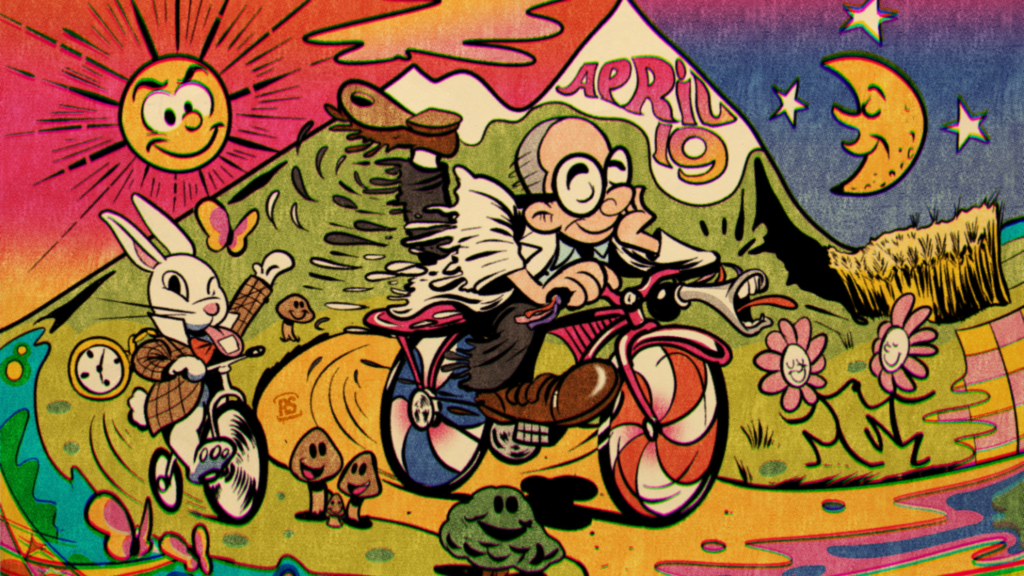April 19th marks an extraordinary day in the world of science, discovery, and human ingenuity. It’s Bicycle Day, an annual celebration of the serendipitous discovery of LSD by Dr. Albert Hofmann in 1943. This remarkable day is not only about acknowledging the accidental creation of one of the most intriguing psychoactive substances known to man, but also a reminder of how many groundbreaking medicines were formulated by chance. Let’s dive into the alchemy of Dr. Hofmann’s discovery and its relevance today.
The Magical Ride: Dr. Hofmann’s Discovery
Dr. Albert Hofmann, a Swiss chemist, was working at Sandoz Laboratories (now part of Novartis) when he first synthesized lysergic acid diethylamide (LSD) in 1938. He was attempting to create a compound to stimulate the respiratory and circulatory systems, but LSD-25, as it was initially named, didn’t show the desired results. The compound was shelved, and it wasn’t until five years later that Dr. Hofmann accidentally ingested a small amount and experienced its psychedelic effects. Intrigued, he deliberately took a dose of LSD on April 19, 1943, and rode his bicycle home, hence the name “Bicycle Day.”
Accidental Alchemy: Groundbreaking Medicines and Serendipity
The story of LSD is a prime example of how many life-changing discoveries in medicine were made by chance. These accidental breakthroughs are akin to alchemy, transforming the ordinary into the extraordinary. Some of the most well-known examples include:
- Penicillin: In 1928, Alexander Fleming discovered penicillin when he observed that mold growing in a petri dish had killed the surrounding bacteria. This accidental finding paved the way for modern antibiotics.
- X-rays: Wilhelm Conrad Röntgen stumbled upon X-rays in 1895 while experimenting with cathode rays. His discovery revolutionized medical diagnostics and imaging.
- Insulin: Frederick Banting and Charles Best discovered insulin in 1921 while trying to isolate secretin, a hormone that stimulates the secretion of pancreatic juice. Their work led to life-saving treatments for millions of people with diabetes.
- Viagra: Sildenafil, the active ingredient in Viagra, was initially developed to treat angina, but during clinical trials, it was found to be more effective in treating erectile dysfunction. This accidental discovery has since helped millions of men worldwide.
The Alchemy Continues: Modern-Day Relevance
Today, the spirit of Bicycle Day and the accidental nature of groundbreaking discoveries in medicine live on. Researchers continue to study the potential therapeutic uses of LSD, such as for treating anxiety, depression, and post-traumatic stress disorder. These studies are part of a broader movement in the scientific community to understand the potential of psychedelic substances for mental health treatment.
Additionally, the story of Bicycle Day serves as an inspiration for scientists, researchers, and entrepreneurs. It reminds us to stay open to the unexpected and to embrace serendipity as a driving force behind innovation. In a world where we often seek predictability and control, the alchemy of accidental discoveries teaches us the value of curiosity, humility, and adaptability.
In conclusion, let us celebrate Bicycle Day by acknowledging the role of serendipity in shaping the world of medicine. From Dr. Hofmann’s discovery of LSD to the countless other accidental breakthroughs, these moments of alchemy have transformed lives and pushed the boundaries of human understanding. Let us embrace the unexpected and cherish the role of chance in the ever-evolving journey of scientific discovery. Happy Bicycle Day!
Related Article:
Breaking the Stigma: Building Political Support for Therapeutic Healing
The Rise of Psychedelic Churches: Exploring the Intersection of Spirituality and Psychedelic Use
